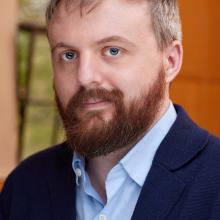Musicologists James Currie (University at Buffalo – SUNY) and Melanie Lowe (Vanderbilt University) discuss themes of forgery, identity, and authenticity with UW School of Music faculty member Frederick Reece in the final installment of the School of Music 2022 THEME lecture series.
Biographies
James Currie
James Currie is a writer, performer, and Associate Professor in the Department of Music at the University at Buffalo (State University of New York), where he teaches music history to undergraduates and classes on music and philosophy at the graduate level. He is also on the faculty of the university’s Center for the Study of Psychoanalysis and Culture. He has worked in collaboration with a number of composers, most notably the young Singapore composer Diana Soh, for whom he has written texts for commissions from IRCAM (“Arboretum: Of Myths and Trees,” 2013), Radio France (“A/Z” 2017), and the Singapore Symphony Orchestra (“Abugida,” 2018). But he has also been active as a performance artist and poet creating works that employ a hysterization of traditional dramatic techniques as a means of exploring the junctures at which the quotidian content of daily life and the abstract, structural rigors of aesthetic form interact in processes of disturbing, mutual self transformation, such as in his three-act work theatre work “Examples of Excess.” The combination, on the one hand, of processes that are more akin to musical practices with, on the other, more normative modalities of dramatic and theatrical writing has lead him to performing his dramatic works (such as his “Note to Self”) with musicians such as the widely acclaimed contemporary music soprano Tony Arnold of the International Contemporary Ensemble (ICE). And indeed, the tension created between the expressive modes produced by singers and those produced by actors is, at a certain level, at the heart of his work. He has also had a noted interest in the potential of solo monologue forms, particularly the lecture format, which he has tended to deform into either ritualistic expressionism or poetic stasis, in both cases leaving the lecture’s normal function (of communicating facts and information) abandoned and exposed, such as in his 2013 performative lecture “On Sonic Gravity,” that was given, as a result of invitation, at the Center for Contemporary Theory at the University of Chicago.
Widely published and internationally in demand, in North America, Europe and Asia as an invited guest speaker, his intellectual work has likewise sought to disturb the categories of disciplinary formations as a means of unleashing aesthetic forces into the very production of intellectual discourse. Thus, in its written form, he has tended to experiment more with the essay than the article, using the more open-ended, speculative qualities that it encourages as a means of investigating the points of vexed intersection between music history, politics, philosophy, and creative writing, as for example in his “Garden Disputes: Postmodern Beauty and the Sublime Neighbor,” which appeared in Women and Music (2008). This is work that has appeared in venues across a wide range of disciplines and which moves rapidly between musicology, philosophy, psychoanalysis, queer studies, and critical theory. Notable instances would include his widely discussed and oft-cited 2009 piece, “Music After All” (Journal of the American Musicological Society), and his polemical 2012 monograph, Music and the Politics of Negation, which, as Martin Scherzinger, a professor in the Department of Media, Culture, and Communication at New York University, wrote, “is part memoir, part history; part formal analysis, part hermeneutic excursion; part philosophical argument, part political manifesto.” As a lecturer, he has been concerned to bring a dramatic intensity into their writing and performance as a means of unleashing a certain passionate intensity that exists in excess of mere discourse production, and in this he takes inspiration from Schoenberg’s famous remark, that the role of the teacher is “to infect his students” not just to inform them. As with his work as a writer and performer, so with his intellectual practice: the aim is less to put something to bed and bring something to rest, and more to intervene into practices to allow for the possibility for something to happen. To others.
Melanie Lowe
Melanie Lowe is Associate Professor of Musicology at Vanderbilt’s Blair School of Music, where she has been on the faculty since 1998. Her research focuses on constructions of musical meaning, from topic theory in late 18th-century music to uses of classical music in 21st-century media, and from “tween” sexuality and nascent feminism in teen pop to ironic masculinity in electropop.
Her book Pleasure and Meaning in the Classical Symphony (Indiana University Press, 2007) explores why the public instrumental music of late-18th-century Europe has remained accessible, entertaining and distinctly pleasurable to a wide variety of listeners for more than 200 years. By placing listeners at the center of interpretive activity, Lowe’s book offers an alternative to more traditional composer- and score-oriented approaches to meaning in the symphonies of Haydn and Mozart.
Her co-edited volume Rethinking Difference in Music Scholarship (Cambridge University Press, 2015) grapples with the changed intellectual landscape since difference-based musicological scholarship was embraced by the field in the 1990s. The book situates difference within broader debates over recognition and freedom, voicing a range of perspectives to reveal why differences and similarities among people matter for music and musical thought.
Among her other musicological publications are articles and reviews published in The Oxford Handbook of Topic Theory, the Journal of Musicology, American Music, Beethoven Forum, Popular Music and Society, The Cambridge Companion to Haydn, the Cambridge Haydn Encyclopedia, the Journal of the American Musicological Society, The World of Music, Popular Music Scenes, and Oxford Bibliographies Online.
Lowe is also deeply committed to the scholarship of teaching, and her publications on pedagogy include articles in the Journal of Music History Pedagogy, the Norton Guide to Teaching Music History, and the edited volume Teaching Music History.
She has presented scholarly papers throughout North America, Europe, and Australia, and among her numerous awards are the Madison Sarratt Prize for Excellence in Undergraduate Teaching, the Reverend James Lawson Lectureship for Service and Leadership, the Blair Faculty Excellence Award, and the Princeton Graduate Alumnae Excellence in Teaching Award.
Lowe earned her Ph.D. and M.F.A. in Musicology from Princeton University and her B.A. from Smith College.

Frederick Reece studies music and sonic culture from 1789 to the present. Thematically, his research centers on issues of authorship and identity, and on sound’s conceptual intersections with the occult and supernatural.
Reece’s first book, Forgery in Musical Composition: Aesthetics, History, and the Canon, (Oxford University Press, 2025) traces the practice of compositional forgery—i.e., fraudulently signing famous historical names like Haydn, Mozart, and Schubert to one’s own original works—across two centuries of classical music culture, from the 1790s to the 1990s. At its core, the text contends that fake historical masterpieces are characteristic byproducts of the canon’s own internal logic, and that the most successful forgeries seduce us by mirroring deeply held cultural beliefs about authenticity, innovation, and meaning in music.
Further articles, reviews, and book chapters have appeared in such venues as the Journal of Musicology, the Journal of the American Musicological Society, the Mosaic Journal of Music Research, and the Oxford Handbook of Public Music Theory.
At the University of Washington, Reece offers a range of seminars on topics related to his research interests as well as core music theory and analysis classes for both majors and non-majors. Off campus, he is a frequent pre-concert lecturer at the Seattle Symphony.
Before joining the faculty at the UW in 2021, Reece was Postdoctoral Resident Scholar and Visiting Assistant Professor in Music Theory at Indiana University and Lecturer in Musicology and Music Theory at the University of Miami’s Frost School of Music. He was educated at the University of Oxford (B.A.) and at Harvard University (M.A., Ph.D.), and has been the recipient of numerous research awards, including a DAAD Fellowship, a Harvard Horizons Fellowship, and the American Musicological Society's Paul A. Pisk Prize, AMS 75 PAYS Subvention, and Alvin H. Johnson AMS 50 Fellowship.
Applicants interested in graduate study in Music History at the University of Washington are warmly encouraged to make contact to discuss research projects intersecting with any of Reece’s areas of expertise.


